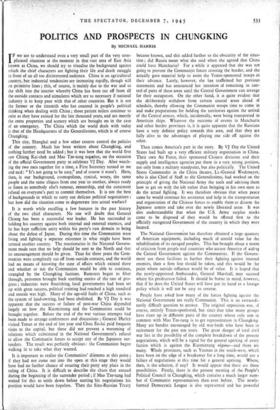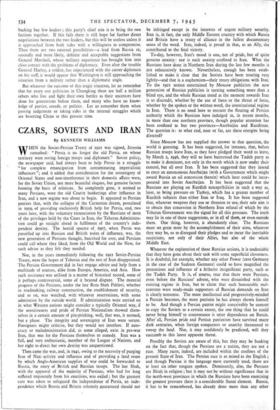POLITICS AND PROSPECTS IN CHUNGKING
By MICHAEL HARRIS
IF we are to understand even a very small part of the very com- plicated situation at the moment in that vast area of East Asia known as China, we should try to visualise the background against which the chief characters are fighting their life and death struggle in front of an all too disinterested audience. China is an agricultural country, but industrial tendencies are increasing rapidly, though still on primitive lines ; this, of course, is mainly due to the war and to the shift into the interior whereby China has been cut off from all the outside contacts and stimulants which are so necessary if national industry is to keep pace with that of other countries. But it is not the farmer or the tinsmith who has counted in people's political thinking when dealing with China ; those patient toilers continue to exist as they have existed for the last thousand years, and are merely the extra properties and scenery which are brought on in the case of an emergency. The China which the world deals with today is that of the Headquarters of the Generalissimo, which is of course Chungking.
This city, Shanghai and a few other centres control the policies of the country. Much has been written about Chungking, and nothing further need be added ; but it was here that the world first saw Chiang Kai-shek and Mao Tze-tung together, on the occasion of the official Government party to celebrate VJ Day. After watch- ing the two men together for a time, a First Secretary turned to me and said: "It's not going to be easy," and of course it wasn't. Here, then, is our background, cosmopolitan, cynical, weary, the same people and the same cliques from one year to another, always ready to listen to somebody else's rumour, censorship, and the consistent refusal on everyone's part to commit themselves. It is not the best of backgrounds in which to carry out delicate political negotiations ; but how did the situation come to degenerate into actual warfare?
It is worth while recalling a few features in the past history of the two chief characters. No one will doubt that General Chiang has been a successful war leader. He has succeeded in holding his country.against both internal and external enemies, and he has kept sufficient unity within his party's vast domain to bring about the defeat of Japan. During this time the Communists were living and fighting a separate existence in what might have been termed another country. The reactionaries in the National Govern- ment made sure that no help should be sent to the North and that no encouragement should be given. Thus for three years the Com- munists were completely cut off from outside contacts, and the world had no means of knowing the state of affairs which existed there and whether or not the Communists would be able to continue, strangled by the Chungking factions. Rumours began to filter through, pressmen brought back startling stories of the rate of pro- gress ; industries were flourishing, local governments had been set up with great success, political training had reached a high standard and morale was high. Many of the age-old faults of China, such as the system of land-owning, had been abolished. By VJ Day it was apparent that the success or failure of post-war China depended largely on how the Kuomintang and the Communists could be brought together. Before the end of the war various attempts had been made to arrange conferences and discussions ; General Hurley visited Yenan at the end of last year and Chou En-lai paid frequent visits to the capital, but these did not prevent a worsening of relations which culminated in the National Government's refusal to allow the Communist forces to accept any of the Japanese sur- renders. The result was perfectly obvious: the Communists began walking in to take what they wanted.
It is important to realise the Communists' dilemma at this point ; if they had not come out into the open at this stage they would have had no further chance of assuring their party any place in the ruling of China. It is difficult to describe the chaos that ensued during the beginning of the surrender period ; if Mao Tze-tung had waited for this to settle down before starting his negotiations his position would have been hopeless. Then the Sino-Russian Treaty became known, and this added further to the obscurity of the situa- tion; did Russia mean what she said when she agreed that China could have Manchuria? For a while it appeared that she was not going to prevent the Communist forces crossing the border, and she actually gave material help to assist the Yenan-sponsored troops in their advance. Lately, however, she has reaffirmed her previous statements and has announced her intention of remaining in con- trol of parts of these areas until the Central Government can arrange for their occupation. On the other hand, it is quite evident that she deliberately withdrew from certain coastal areas ahead of schedule, thereby allowing the Communist troops time to come in and make preparations for holding the territories against the arrival of the Central armies, which, incidentally, were being transported in American ships. Whatever the outcome of events in Manchuria and other border provinces is, it is quite apparent that the Russians have a very definite policy towards this area, and that they are fully alive to the advantages of playing one side off against the other.
Then comes America's part in the story. By V] Day the United States had built up a very efficient military organisation in China. Their own Air Force, their sponsored Chinese divisions and their supply and intelligence agencies put them in a very strong position, not only from a military standpoint, but also politically. The United States Commander in the China theatre, Li-General Wedemeyer, who is also Chief of Staff to the Generalissimo, had worked on the principle of giving the National Army the tools and advising them how to get on with the job rather than bringing in his own men to do the actual fighting. It was therefore obvious that when peace came he would continue his assistance and help in the transportation and organisation of the Chinese forces to enable them to disarm the Japanese armies and take over the newly liberated areas It was also understandable that when the U.S. Army surplus stocks came to be disposed of they would be offered first to the officially recognised Government of the country in which they were located.
The National Government has therefore obtained a large quantity of American equipment, including much of untold value for the rehabilitation of. its ravaged peoples. This has brought about a storm of criticism from people and countries who accuse America of aiding the Central Government against the Communists. If the Govern- ment use these facilities to further their fighting against internal enemies, then a firm line should be taken, and this would be !he point where outside influence would be of value. It is hoped that the newly-appointed Ambassador, General Marshall, may succeed where his predecessor failed. It should be borne in mind, however, that if he does the United States will have put its hand to a foreign policy which it will not be easy to reverse.
People have asked how many of the forces fighting agamst the National Government are really Communist. This is an extraordi- narily difficult question to answer. The original opposition was, of course, entirely Yenan-sponsored, but since that time many groups have risen up in different parts of the country whose only aim in common with Mao Tze-tung is to get representation in Chungking. Many are bandits encouraged by old war-lords who have been in retirement for the past ten years. The great danger of total civil war lies in the possibility of the complete breakdown of the present negotiations, which will be a signal for the general uprising of every faction which is against the Kuomintang regime—and there are many. Whole provinces, such as Yunnan in the south-west, which have been on the edge of a breakaway for a long time, would use a failure of negotiations at this time for a general uprising. Where, then, is the solution, if any? It would appear that there are three possibilities. Firstly, there is the present meeting of the People's Political Council in Chungking, which contains a much larger num- ber of Communist representatives than ever before. The newly- formed Democratic League is also represented and has powerful
backing but few leaders ; this party's chief aim is to bring the two factions together. If this fails there is still hope for further direct negotiations between the two leaders, but this will be useless unless it is approached from both sides with a willingness to compromise. Then there are two external possibilities—a lead from Russia or, secondly and more likely, definite and acceptable suggestions from General Marshall, whose military experience has brought him into close contact with the problems of diplomacy. Even after the trouble General Hurley, a soldier, has experienced with the career diplomats on his staff, it would appear that Washington is still approaching the situation from a military rather than a diplomatic angle.
But whatever the outcome of this tragic situation, let us remember that for every one politician in Chungking there are half a million others who live and fight their own battles as their ancestors have done for generations before them, and many who have no know- ledge of parties, creeds, or politics. Let us remember them when passing judgement or taking sides in the internal struggles which are besetting China at this present time.































 Previous page
Previous page